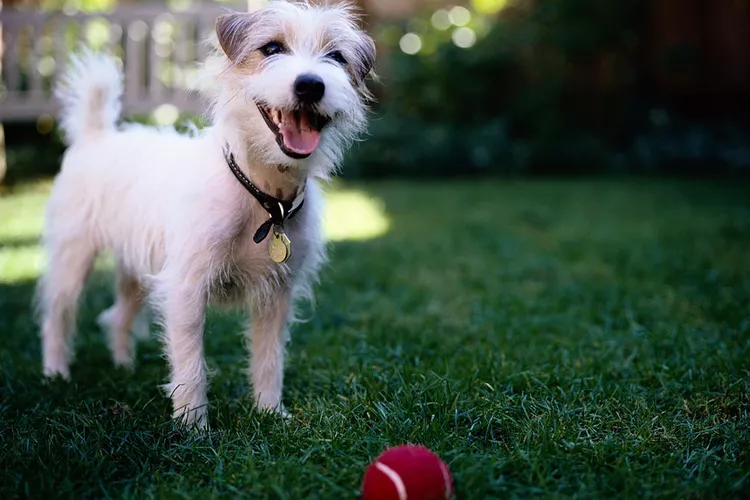
It's no secret: some dogs love to howl at sirens. Why do some dogs feel compelled to vocalize when an ambulance drives by wailing their sirens? Why are other dogs unbothered by the sound of sirens? What can you do if your dog insists on howling at every siren sound they hear?
As with most dog behaviors, the true reason behind howling at sirens isn't known, but most experts believe that there are two strong possible reasons for it.
The most commonly held belief is that howling at sirens is a holdover from your dog's ancestors. Wolves communicate to one another through different kinds of noises and vocalizations, but howling is one that they are most known for. Some of these howls we can hear, but keep in mind, wolves and dogs have a much sharper sense of hearing than our own. Your dog can hear (and create) sounds at frequencies that we can't. So when your dog hears a siren in the distance, they may think it's another dog trying to communicate with them. When your dog howls in response to the siren, they may simply be trying to say, 'Hey! I hear you and I'm over here!'
Another common belief as to why dogs may howl at sirens harkens back to some dogs being utilized as a protector or watchdog for a family. Your dog may hear a siren in the distance and not know what it is. This new sound may be harmless, but it may also be a threat and, as they say, it's better to be safe than sorry. So, being the faithful and loyal companions that they are, your dog may howl at a siren as a way to warn you and other members of your family that there is a potential danger nearby. This may also explain why a dog may howl at sirens more the second time they hear. This is because, as the emergency vehicle drives further away, your dog may think their howling scared it away, thus reinforcing the behavior.
For some people, the high pitched squealing of a siren can be an annoyance to our own ears. This may lead you to believe that your dog may howl at sirens because the sound bothers them or may even cause them pain. However, most experts don't believe this is the case. Dog body language relies on more than just one behavior and a dog in distress will exhibit multiple 'classic' behaviors and body language cues. If your dog is howling at a siren but not exhibiting any other signs of stress, such as cowering, hiding, or lip licking, your dog is probably howling for one of the aforementioned reasons and not because they're distressed by the noise.
Most experts believe that dog breeds that are more closely related to wolves may be more likely to howl at sirens than other breeds. This includes various Spitz breeds, such as Huskies, Malamutes, and American Eskimos. Another group of dogs that may be more likely to howl at sirens are hound dogs that hunt in packs and/or utilize baying and vocalization in their hunting. This can include breeds such as beagles, foxhounds, and coonhounds.
Obviously, all dogs are individuals. Not all breeds are the same and not all dogs of a specific breed are the same either. So you may have a chihuahua that readily howls at sirens or you may have a beagle that is just uninterested in the noise of a siren.
There can be different reasons why your dog howling at a siren may be undesirable. Maybe you live in an apartment complex, or maybe you just don't appreciate the added noise when an emergency vehicle drives by. There are some things you can do to help break your dog of their howling habit. One thing is to teach your dog 'quiet' or even 'thank you'. Pair your dog sitting quietly and calmly in response to either of these cues with a reward. When your dog knows what these cues mean and can reliably respond to either with being quiet and calm, you can use them to get them to stop howling at a passing siren. It's important to remember to reward your dog when they show the desired behavior of being quiet rather than scolding them for howling at sirens. Some dogs may be more resilient than others, but others may learn to associate the sound of a siren with being scolded, which may lead to noise phobia or fear and anxiety when they hear a siren or anything that remotely sounds like a siren.
Training your dog to not howl at sirens may take a little longer than training them other cues. It is an instinctive behavior, after all. If you're having trouble, talk to your veterinarian. They can suggest local dog trainers that can help.

212 Hairless Cat Names For Your Beautifully Bald Feline
Discover the perfect name for your hairless cat with our list of over 200 creative and unique names. From quirky to classic, find a fitting choice for your beautifully bald feline companion.
8 Things Your Cat Loves
Just like humans, cats can have a long list of things they like. Find out what cats love so you can keep your cat happy and healthy.
How to Tell If a Kitten is a Boy or a Girl
If you're wondering whether your new kitten is a boy or a girl, here are three ways to help determine the sex of your cat.
8 Tips to Help Cats Enjoy Car Travel
Cats are creatures of habit, and they hate to travel. Learn tips to prepare them for travel in the car, whether going to the vet or on vacation.
Common Causes of Mucus in Dog Poop
Seeing mucus in your dog's poop can be concerning to a dog owner. Here are common causes and treatment of mucus in a dog's stool.
Is Shrimp Bad For Dogs?
Shrimp can be a healthy, nutritional food for people but can dogs eat them, too? What are the main concerns with feeding shrimp to your dog?
Can Dogs Eat Grapes?
Are grapes safe for dogs? Grapes and raisins can cause serious toxicity in dogs. Find out what to do if your dog eats grapes.
Maine Coon Cat: Breed Profile, Characteristics & Care
The Maine Coon cat is of the largest cat breeds in the world. These amiable, gentle cats make great companions. Learn about the Maine Coon cat breed's appearance, temperament, health, and care needs.
Selkirk Rex: Cat Breed Profile, Characteristics & Care
The Selkirk Rex is a charming cat with a tousled coat and a loving, laid-back personality. Learn about the Selkirk Rex breed.
How to Stop Your Cat From Chewing Electrical Cords
Cats are known to pounce and attack inanimate objects, like electrical cords. Learn how to prevent your cat from ambushing objects that may harm it.
What Do Cats Think About?
Have you ever wondered what cats think about? A number of studies have explored cat behavior and feline cognition, but there's still more to learn.
Training Your Kitten to Use the Litter Box
Bringing home a new kitten means they need to learn how to properly use a litter box. Discover how to successfully litter box train your kitten.
Why Do Cats Knead?
Kneading is a common behavior in cats of all ages. Learn why cats "make biscuits" and what it means for you, your cat, and all your blankets.
Dandie Dinmont Terrier: Dog Breed Characteristics & Care
Learn about the Dandie Dinmont Terrier, a silky dog breed with a signature puff of hair atop its head and a friendly, companionable personality.
Tibetan Mastiff: Dog Breed Characteristics & Care
Learn about the Tibetan mastiff, an ancient guardian dog breed. This breed is known for their massive stature, flowing mane, and protective personality.
4 Reasons Why Your Dog Licks Their Butt
Butt-licking in dogs can be a part of normal grooming, but excessive butt-licking is not normal. Read about the most common reasons for this behavior.
How to Teach Your Dog the "Leave It" Command
Training your dog the "leave it" command is a great way to instill self-control. Learn how to teach your dog to not pick things up from the ground.
How to Solve Your Dog's Fear of Car Rides
Is your dog scared of car rides? This fear of riding in cars is common. Learn why your dog is scared of car rides and how to help conquer this fear.
Can Dogs Get Depression? How to Help Your Sad Dog
Can dogs get depression? Learn about the signs of depression in dogs and find out how to help your sad dog.
How to Play Tug of War With Your Dog
Many dogs love to play tug of war, and it's a healthy game that provides great exercise. Learn the best way to safely play tug of war with your dog.